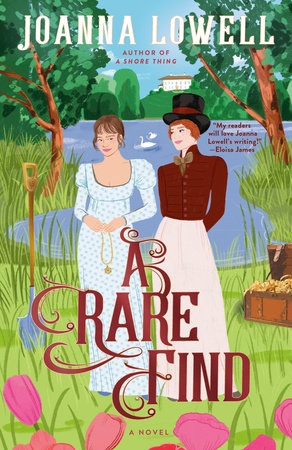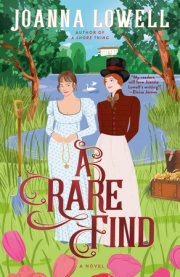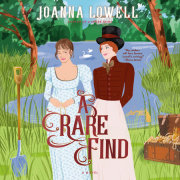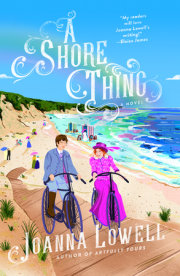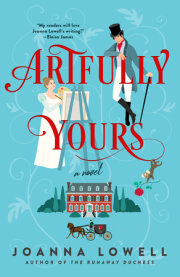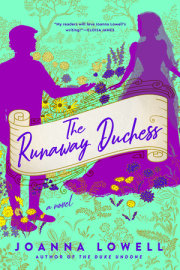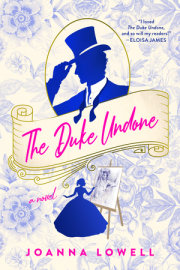1
Derbyshire
1818
The bushes thrashed violently. Elfreda put down her trowel and sat back on her heels. The bushes began to growl.
"Wolves," she guessed. "Two ferocious, green-eyed wolves from the Dark Peak."
One bush gave a loud gasp: "Are there wolves in the Dark Peak?"
The other bush made a shushing noise.
"Most certainly," said Elfreda. She liked inventing legends as much as she liked reading them. "The Dark Peak is where the wolves went when mean old Edward Longshanks tried to have them all killed. You can hear them howling when the wind blows from the north."
Both bushes squealed.
"Is it far?" asked the one.
In an instant, Elfreda understood her blunder. She could already imagine her sisters skipping into the craggy wilds.
"Terribly far." She adopted a commiserating tone. "And the way is closely guarded by a regiment of aunts armed with curling tongs."
The bushes, which had been rustling excitedly, now observed a horrified silence.
It had been nearly three years since Aunt Susan had returned to Surrey, but her tenure at Marsden Hall had left an indelible mark-not the improving one that she'd intended.
"And castor oil," added Elfreda for good measure. "These aunts won't let anyone step foot near a wolf. They are the sort who prohibit dogs in the nursery."
She couldn't see her sisters' faces, but she thought the foliage drooped. Good. Dejection was better than them running off and someone finding them a thousand years from now in a peat bog on the Howden Moors.
She turned her attention back to her work. She'd been digging for weeks, cutting trenches across the wooded bluff, a slow and solitary effort. Once Papa had lost interest, he'd stopped paying the laborers who'd helped break ground. Part of her wondered if it was folly to dig so long without assistance, and without result.
Take this trench. She'd exposed a layer of loam, and then marl, and then clay, and then something darker-possibly char from ancient cookfires. No buckles, though. No nails. No fragments of pottery. No proof.
All her hopes rested on an entry in a local annal included in Papa's manuscript copy of The Anglo-Saxon Chronicle, an entry for AD 868.
This year the heathen men overran Mercia as far as Twynham, burning and breaking, so that many were slain. They remained in Mercia, and there fixed their winter quarters.
The heathen men wouldn't have fixed their winter quarters in Twynham, a small settlement, exposed on all sides. They'd have looted St. Alcmund's, and the abbey, and moved on, until they reached a defensive position.
This bluff. The closest to Twynham, and the highest ground for miles. It towered above the river and sloped down to what was now her family's parkland.
A few inked lines had brought her here, and also intuition and common sense.
This was the spot. The one she would have chosen if she were a seaborne raider.
Ergo, she refused to give up.
More growls made her turn her gaze on the undergrowth. She could see Hilda's foot protruding, a foot shod in a badly scuffed boot with trailing laces. Unless it was Matilda's foot. The six-year-old twins shared only a passing physical resemblance, but they were equally ruinous to leather. And muslin. And velvet upholstery.
"Let me guess again." Elfreda pretended to ponder. "I know-you are giant, growling moles!" She beckoned with the trowel. "Come, dear moles. Let us tunnel together deep into the earth, where we shall find the silver ingots of the Great Heathen Army!"
"We are bears." Hilda crawled from the bush. She'd a long red scratch on her cheek and a moth-eaten fur tippet wrapped around her head. She rose onto her knees, hooked her fingers into claws, and bared her teeth. "And we are ravens."
"Ravenous!" Matilda crawled after her. "We aren't ravens bears. Ravens bears have feathers. We are ravenous bears. We have a great hunger, like the hunger of 1044. Papa says it was a sign of doom."
Elfreda frowned. Whenever Papa was in a sulk, he had his children gather in the library after dinner so he could recite to them all the grimmest episodes in the history of the English nation.
"There's no such thing as doom." Elfreda said it brightly.
"Isn't that a sign of doom?" Hilda was considering Elfreda with a frown.
"What?" Elfreda held her breath as her sister crawled closer and hovered a fingertip between her brows.
"Oh," said Elfreda, swiping at her fringe and almost certainly leaving another smudge. "It's dirt."
Hilda was still considering, so Elfreda offered an alternative explanation.
"It is a sign that I am an archaeologist."
The twins surprised her by nodding at once.
"That's why you dig holes," said Matilda.
Elfreda nodded too. This acceptance-swift, uncomplicated, and absolute-did something strange to her heart. The Albion Society of Antiquaries didn't allow female Fellows, and only Papa's name appeared on Two Dissertations on the Saxon Grave Hills of the Peak District, even though she'd authored the second dissertation in its entirety. Elfreda Marsden was nobody. Painfully awkward at social gatherings, unable to speak in front of a group, let alone sing while plinking along on the pianoforte, and with nothing else to show for herself.
But children saw possibility where adults did not. Hilda and Matilda were bears, and Elfreda was an archaeologist, and that was that.
She smiled at the roly-poly, round-faced little cubs, smiled so widely her forehead itched. She scratched and flakes showered down.
Dirt. From the Old Norse, drit.
The Great Heathen Army had left behind many of their words. What she needed was one of their swords.
"Go off home." She made a shooing motion. "Assuage your great hunger with seed cake."
The twins shot to their feet.
"You can bother Agnes!" Elfreda shouted after them as they ran through the trees. "But don't disturb Papa! He's with Mr. Clutterbuck!"
At least, she hoped he was with Mr. Clutterbuck. The visit-Mr. Clutterbuck's first in over a year-could last well into the afternoon. Mr. Clutterbuck and Papa had been friends and colleagues for decades and always had much to discuss. On the other hand, the visit could have ended as soon as it began, with shouting and broken china. Mr. Clutterbuck was now the president of the Albion Society, which had involved stabbing Papa in the back.
Elfreda had poured the tea and raced to the bluff immediately after, praying-foolishly, desperately-that today was the day. She'd dig something up in time, before Mr. Clutterbuck continued on his way to Wales. Something to show him what the twins believed, what Papa seemed to believe when it was just the two of them, rambling from barrow to barrow in the countryside.
She was an archaeologist.
For another hour or so, she sifted the soil. Nothing. Pebbles clunked in her sieve, and she tossed them one after the other onto the pile behind her. The one in her hand now-it felt odd. Its shape, the weight of it. She tried to peel the caked dirt with her nails, to no avail.
She sprang up, and swayed, vision going white, spots dancing in the air around her. She gripped the not-pebble tight in her hand. It steadied her. She launched herself forward, skirts tangling about her legs as she ran.
The River Thorn was the closest source of water, but the bluff dropped down to the bank so steeply it might as well have been a cliff. She ran away from the river, down the mellow slope toward the park. A slight deviation of course brought her instead into the woodland, which would open eventually into a clearing with a fishing pond dead center.
Technically, their neighbor, Henry Redmayne, owned the woodland, but he was in France, and his insufferable sister Georgina was in London. The pair had always considered themselves too dashing for the retirement of country life. Things had been quieter in the neighborhood during the five years they'd been gone.
Elfreda sometimes snuck away from her sisters and read by the pond, her back against the trunk of the willow tree. But today, the pond would provide more than serenity.
Her sides were heaving as she burst into the clearing. She paused to catch her breath. The spring afternoon was bright, and the pond lay before her, flashing in the sun.
She crouched on the bank and dipped her fist. The cold itself felt bright.
She scrubbed the pebble clean with the pads of her fingers and flushed with anticipation as she withdrew her hand.
There it was, a leaden object an inch in length, topped by a shorter perpendicular arm.
A hammer.
Or rather, an amulet shaped like a hammer.
A thousand years ago, a living, breathing Northman had worn it close to his skin as he pulled the oars and rowed across the whale-road, leaving the shores of his homeland behind.
Papa, Mr. Clutterbuck-they had only to glance.
She stared at it herself now in wonder, her scrutiny finding delicate traceries in the metal surface.
It had been engraved.
She scrambled to her feet, heart pounding in her throat. The hammer felt heavier by the second in her palm.
The Great Heathen Army had, in fact, overwintered on the bluff. No one had ever corroborated a literary reference to one of their winter camps.
Until now. She had. Elfreda Marsden.
She needed to run like the wind back to the house.
She allowed herself one more moment, just her and the hammer.
She didn't realize she'd closed her eyes until the darkness shattered into stars. Her breath whooshed out as her ribs compressed. Whooping cries pierced the hush, and she was off her feet, lifted bodily into the air, and then she was falling, falling-splash! She felt a frigid slap of water, and the pond closed over her head.
2
Georgie! What have you done?"
Elfreda registered a shocked, high-pitched voice with one ear. The other ear was underwater. She pushed off the pond's mucky bottom, struggling to her knees.
"You tried to drown a perfect stranger." The scolding continued. "It was absolutely sinister."
"She's not a stranger," came the low reply.
What Elfreda saw on the bank belied the claim. Strangers. Two of them. A tall young woman in a peach-blossom walking dress, blonde ringlets peeking from a bonnet of blue crepe. A hatless gentleman in top boots, buckskin breeches, and a riding coat, thick russet hair waving upon his brow.
There was no time to wonder how or why.
She relaxed her fisted fingers with difficulty, then gazed with horror into her hand.
It was empty.
She'd let go. When that sinister sprig of fashion had attacked, she'd let go.
"No." She flung forward. She plunged both hands through insubstantial silt, buried them in clinging mud, and scooped.
Tadpoles. A slimy twig. A pebble. Another pebble. Another pebble. Pebbles by the hundred. By the thousand.
"No, no, no." She pivoted wildly. Every movement spread billowing brown clouds through the water.
"Elf," said the gentleman. "Did you lose something?"
She froze.
The gentleman strolled toward her. He had a loose-limbed, athletic stride, a way of moving that epitomized smugness. And that face. That unmistakable face.
She stared, spellbound by incipient dread.
The hair was short, and darker than it had been a half decade ago when she'd seen it last, arranged in shining twists and braids. The wicked slant of the brows was the same. The high cheekbones. The square jaw that framed a deceptively sweet-looking mouth. The pale blue eyes edged with long black lashes.
Certainty struck like a lightning bolt.
Her mouth went dry. She was dripping everywhere, but she could barely unstick her tongue from her teeth.
"Georgina," she croaked. "Damn you."
She'd imagined uttering those words on innumerable occasions.
Saying them now brought no comfort.
Georgina Redmayne gave her a dazzling smile. "I've certainly been trying."
Elfreda stifled a scream. She punched the pond instead, dredging up another handful of mud.
"Oh," murmured the young lady, looking between them. "You are acquainted. Georgie, you tried to drown someone you know?"
"I thought she was Rosalie." Georgina waved a hand. "Something about the hair. From behind."
"You tried to drown Rosalie." The young lady sounded outraged. "Your dearest friend. You are a monster."
"Dunk, not drown." Georgina sat and tugged off a boot. "She knocked me out of the boat the other day. You weren't decrying attempted murder then."
The young lady ignored this.
"Lucky for Rosalie, she escaped," she said. "Most unlucky for poor . . ." She trailed off as she picked her way along the bank, her ribboned slippers disappearing in the rushes at the verge. "Should I call you Elf?" she asked Elfreda, bending down, as one did when addressing a child. "I gather you and Georgie grew up together? I don't believe I've ever seen you in town."
"She doesn't go to town." Georgina tugged the second boot, more sharply. "She molders in Marsden Hall. The pile on the hill."
"The pile on the hill!" The young lady beamed. "I adore it. So picturesque. I'm delighted to meet you, although I understand if you don't return the sentiment at present. I hope we can renew our acquaintance when we both have dry feet."
Elfreda didn't offer her response.
I would rather dry my feet in the fires of hell.
She let the mud in her hands plop into the water.
"I'm Anne," continued the young lady, undeterred, "Anne Poskitt, of the Halifax Poskitts. Did you lose a ring? A fish might have swallowed it. Fish are always swallowing rings, in fairy tales anyway, which usually have some truth to them. Did you know Bluebeard was a real person? And apples can poison you if you eat the seeds."
Elfreda made a choking sound as she clawed up more mud. More pebbles. Her head was hot, and her toes were nubs of ice.
"Why were you wearing a ring?" Georgina splashed barefoot into the pond. "Don't tell me you're married."
"I'm not telling you anything." Elfreda rose to standing, rivulets streaming down her legs.
"Good Lord, you are married. How can that be?"
Elfreda pushed past her.
"Who is he?" Georgina followed. "Did he dress in sprinkled calfskin and trick you into thinking he's a book?"
Elfreda spun. "You-" She failed to finish the insult. Georgina was an inch away, emanating dryness and warmth, her gaze the blue of woodsmoke. Mesmerizing as a flame.
"Me?" drawled Georgina. "A favorite topic. Go on."
"Go to the devil," muttered Elfreda and waded for the bank.
"Not until I find your ring," called Georgina. "It's the least I can do."
"For God's sake, I haven't lost a ring." Elfreda turned back. Georgina stood where she'd been standing, arms crossed.
"You're not married," she said, triumphantly smug. "I didn't think so."
Copyright © 2025 by Joanna Lowell. All rights reserved. No part of this excerpt may be reproduced or reprinted without permission in writing from the publisher.

